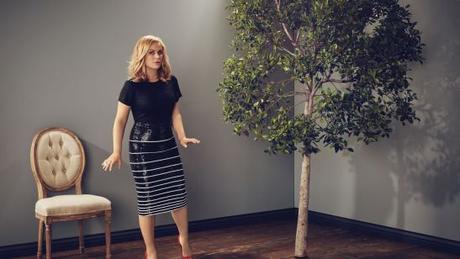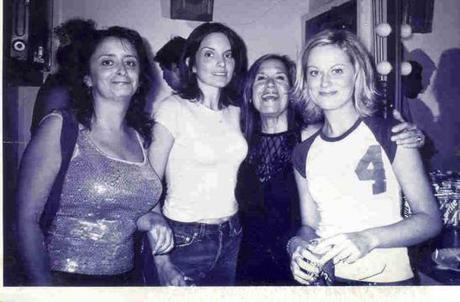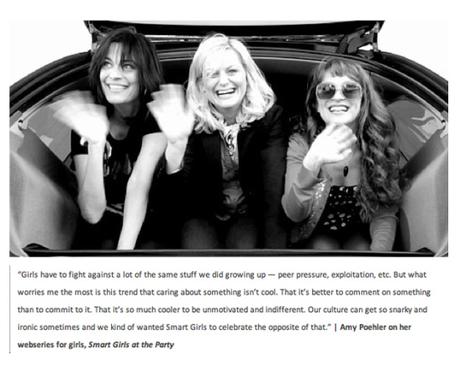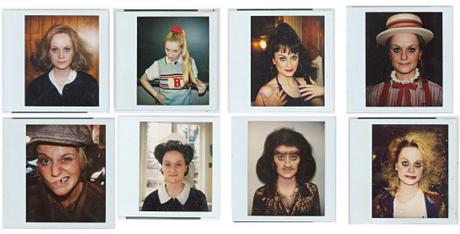
“I’ve failed a million times on stage, just not getting laughs. I’ve listened to notes that I knew weren’t right. I’ve pitched ideas and let other people change them, knowing that it was the wrong choice. The question you have to ask yourself is: How do you want to fail? Do you want to fail in a way that feels like it respects your tastes and value system?” – Amy Poehler, in her recent interview with Fast Company.
I look up to Amy Poehler for a lot of reasons. Most females do. A lot of good males do, too. Most of my friends assume I love her because I do similar things to her – improv, sketch, aspirations to write/perform for TV. We’re also both blonde and female so “OBVIOUSLY that’s why Hayley loves her!”. Those things are all great and coincidental, but it’s not the core of why I look up to her.
I look up to Amy Poehler because she helps other women (and other talented people in general). It’s her job now. Between producing Broad City and Amy Poehler’s Smart Girls amongst other projects, supporting fellow females is literally her job.
And as a woman, helping other women can be hard. Especially in the creative/entertainment industry – because we’re brought up in a world that subconsciously and consciously pits women against one another, or there are limited spots for women, or a bunch of other patriarchal things we couldn’t (I say ‘couldn’t’ instead of ‘can’t’) control. Or maybe it was just hard for me because sometimes I’m a self-conscious egotist who can’t handle other talented woman who deserve to be there just as much as I do.
But I’m getting better, and Amy Poehler’s helping me do so.

iO Chicago champions Rachel Dratch, Tina Fey, Charna Halpern, and Amy Poehler.
I work and perform with a fast-growing improv company in Melbourne. In the previous 2 years, anytime I’d see a new, talented female in her student showcase I’d freak out and I’d hate her for simply being good. I’d feel like my own place in the company was in jeopardy. So I’d haze her a little, because that’s how I was treated when I got into this stuff – other females not welcoming me, pretending like I don’t exist. But jeez, hating takes a lot of energy – so much so that you reach a point where you give in, and you say to that woman “hey, that was a great show. I loved the way you so-and-so”. And she’ll respond with “oh my god, thank you so much. It’s really scary doing this stuff” and you’ll empathise and have a good, honest conversation about how it feels to work in a male-dominated field. And you’ll probably end up very good friends.
I don’t try to intimidate new talent anymore. Sure, I still feel threatened easily, but I know it’ll subside like it has every single time. When I learnt how Poehler saw UCB’s Abbi Jacobson and Ilana Glazer’s web-series Broad City and helped them pitch to Comedy Central and now produces the damn thing, I thought to myself I need to be more like Poehler. I need to see POTENTIAL in these women, not competition. Because that attitude brought Broad City into my word, and thank god for that.
Amy Poehler’s Smart Girls is incredible, and I wish it existed when I was a teenager. I would’ve found a lot of solace in it. The reason I love comedy and writing is because I desperately want people to know they’re not alone, or they’re not the only odd people out there. I pretty much just want everyone to feel comfortable and happy (despite what my early approach to female talent suggests).

I admire Poehler’s approach to new media, too. Change is hard. When people ask me where I see my career going, I say: “I want to be a comedy writer/performer. I’d love to do it for TV, but who know where that’s going to be in 5 or 10 years. Who knows what medium I’ll be working for”. Poehler takes risks and I’ll like that. I try to do more of that everyday.
“While many creative people in Hollywood are floundering in the media sea change, Poehler is surfing—which is what she’s been doing her entire career, starting with her earliest days as a member of the Upright Citizens Brigade, the comedy troupe she helped form in Chicago in the 1990s. “It all goes back to improv,” she says. “It’s all about flexibility, about not knowing what’s going to happen next. You have to listen and stay in the moment. You have to play with people who will support you. You have to get comfortable with being uncomfortable.”
Yeah, Poehler and I are both blonde female improvisers who love comedy and all those other shallow similarities. But I aspire to be as supportive, fearless and self-aware as she is. I’m currently working on a web-series with a fellow female improviser about casual sexism and racism in a female’s everyday life – it’s a comedy, somehow. We have a writer’s room full of smart, hilarious women and it’s just the best. Here’s to more of that!


